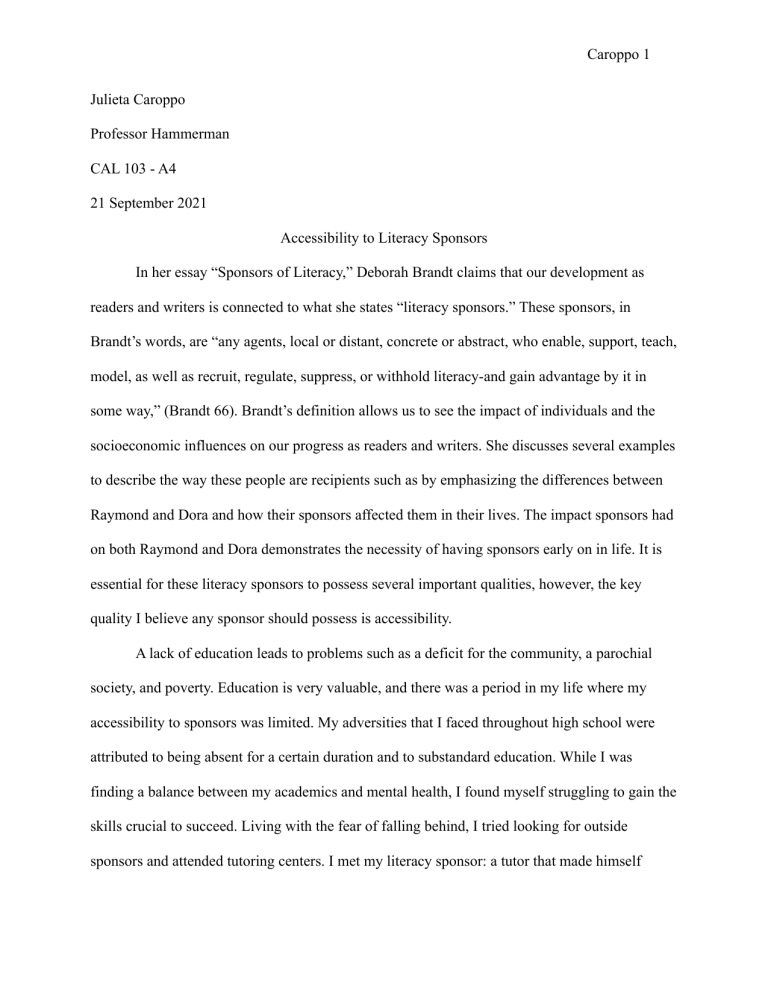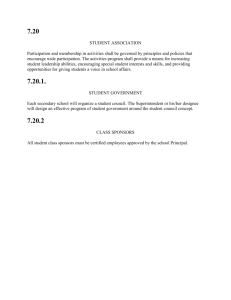
Caroppo 1 Julieta Caroppo Professor Hammerman CAL 103 - A4 21 September 2021 Accessibility to Literacy Sponsors In her essay “Sponsors of Literacy,” Deborah Brandt claims that our development as readers and writers is connected to what she states “literacy sponsors.” These sponsors, in Brandt’s words, are “any agents, local or distant, concrete or abstract, who enable, support, teach, model, as well as recruit, regulate, suppress, or withhold literacy-and gain advantage by it in some way,” (Brandt 66). Brandt’s definition allows us to see the impact of individuals and the socioeconomic influences on our progress as readers and writers. She discusses several examples to describe the way these people are recipients such as by emphasizing the differences between Raymond and Dora and how their sponsors affected them in their lives. The impact sponsors had on both Raymond and Dora demonstrates the necessity of having sponsors early on in life. It is essential for these literacy sponsors to possess several important qualities, however, the key quality I believe any sponsor should possess is accessibility. A lack of education leads to problems such as a deficit for the community, a parochial society, and poverty. Education is very valuable, and there was a period in my life where my accessibility to sponsors was limited. My adversities that I faced throughout high school were attributed to being absent for a certain duration and to substandard education. While I was finding a balance between my academics and mental health, I found myself struggling to gain the skills crucial to succeed. Living with the fear of falling behind, I tried looking for outside sponsors and attended tutoring centers. I met my literacy sponsor: a tutor that made himself Caroppo 2 accessible and helped me recognize that these literacy sponsors did not have to be someone famous or influential to the entire world. It was possible for a literacy sponsor to even be a person at the local tutoring center. Some people like Raymond Branch were fortunate enough to have better access to information, therefore, resulting in more opportunities. Raymond’s parents allowed him better access to information because of their jobs. On the other hand, Dora Lopez had little accessibility to universities and jobs, yet her parents were her literacy sponsors. Brandt establishes the influence one can have on others’ lives, however, the impact of accessibility and privilege can influence who someone’s sponsor is. Although my situation may have not been identical to Dora’s, the fact that we both were at certain disadvantages demonstrates the necessity of having sponsors early in life. I would hope to model myself as a sponsor of literacy that would emphasize the importance of accessibility and privilege. It was visible that Raymond had accessibility to greater sponsors to further his education, however, Dora struggled due to her family’s lack of accessibility to essentials. In my own life, my access to education was affected, however, I was extremely fortunate to receive tutoring and have a sponsor before it was too late. I recognized the importance of having a knowledgeable and accessible tutor, encouraging me to be an accessible sponsor for future aspiring students who are limited. Being able to learn properly and to teach others is essential in society because it is the foundation of education that will eventually impact the social and economic features of the community. I hope that eventually, I can be a sponsor of literacy for others and myself by advancing my education and developing skills that I can pass on to future generations. Caroppo 3 Works Cited Brandt, Deborah “Sponsors of Literacy,” Stevens: 61-88. Stevens Institute of Technology. Perspective on Writing and Education for Stevens Institute of Technology. Ann Arbor, Ml: XanEdu, 2019, Print.



